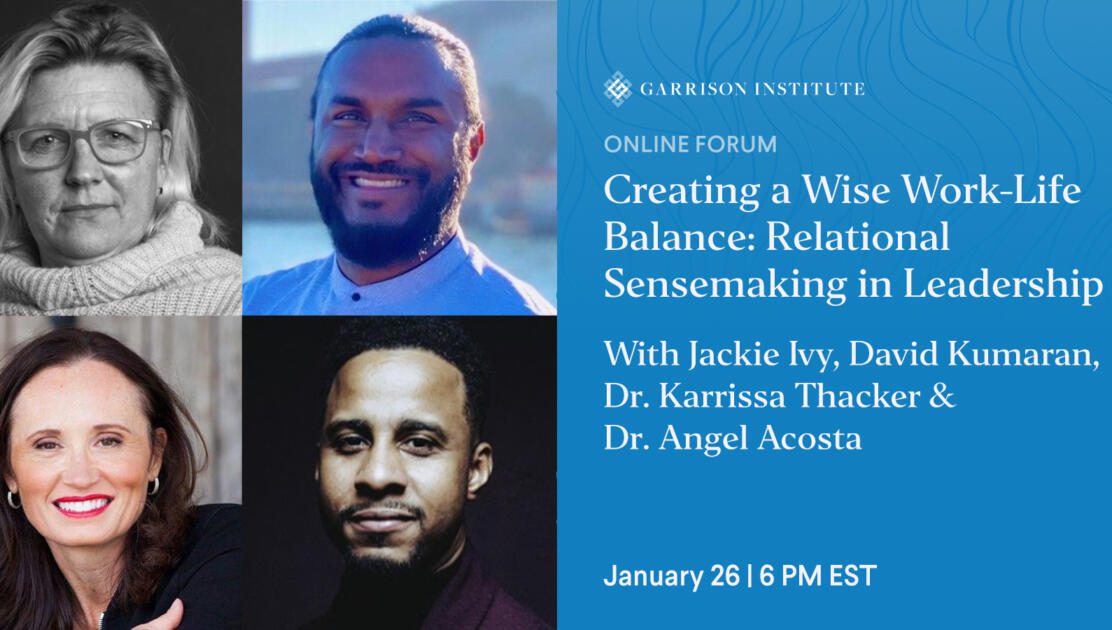Creating a Wise Work-Life Balance: Relational Sensemaking in Leadership
Many organizations, businesses, and institutions are struggling right now to survive economic downturns while also maintaining human wellbeing—and the balancing act can be tumultuous. Tensions and rifts emerge when core values are challenged by workplace demands—causing moral, social, and economic dilemmas.
In this Garrison Institute Fellowship event held on January 26, serial entrepreneur David Kumaran and management consultant Dr. Karissa Thacker joined Fellowship Director Dr. Angel Acosta and Fellow and creative coach Jackie Ivy for a wide-ranging discussion to answer the following questions:
Can we live in a world where difficult conversations are welcomed—even invited—into the workplace?
Can these conversations help us reach a new level of relational sensemaking with one another and our world?
Who has already applied these awareness-based practices, and what can it look like?
Starting at 26:00, Dr. Thacker and David Kumaran were introduced; Dr. Thacker discussed her background as a psychologist and how she asked deeper questions of herself during the pandemic about what she wanted out of life, while Kumaran talked of his career as a “spiritual technologist” who looks at technology as a possibility of how society can raise consciousness and empower individuals.
Dr. Thacker went on to speak about how coming into contact with people from different backgrounds is more difficult today than it was 50 years ago, but that the difficulty only amplifies the redemptive and transformative potential of such conversations.
“I think any time that you can bring difference into space in a way that is safe, is part of the mission, it’s part of what needs to happen. I think about kids, and how well-equipped they are to deal with difference… and all of us coming together and saying, “I really don’t know what’s going on here on earth.” None of us have certainty, but we grasp, and we feel meaning, and when we allow it to happen, magic happens on occasion.”
David Kumaran added on to what Dr. Thacker said by applying the Silicon Valley mantra of “fail fast” to the conversation about the downsides and vulnerability of coming together across differences.
“Silicon Valley and all these industries created Innovation models around what you just said, because they realized that when you mess up, when you fail, that’s literally the moment that you learn the most. You need to immediately lift yourself up… what [tech companies] realized is that in order to make billions of dollars, they need to put people in the room that look very different and let them work on things together, and fail at a high level, and get back and keep going, and that will result in an innovative industry, company, whatever the practice. It’s literally the human process.”
Jackie Ivy then talked about the need to connect contemplation with the notion of “failing fast.”
“When I could perceive that our team was “failing,” yet to admit that in corporate culture… was like death, they did not want to hear about failure… I did not have the skills at the time. I could meditate, I could go to work and do my job, but I didn’t know how to be mindful in my work. So I think to your point when there’s not someone on your team who’s saying “Great job! You just failed!” it’s a lot harder.”
Dr. Thacker brought up Garrison Institute Spiritual Director Sharon Salzberg’s Loving-Kindness Meditation as a useful tool for dealing with the downsides of “failing fast.” David Kumaran said that love is also a powerful tool for dealing with failure.
“Kobe Bryant played the biggest game of his life, and missed all of his shots in that game… his dad said you can fail all that you want, but I’ll still love you. That was unconsious and conscious persmission for Kobe to fail at the highest level. And that’s what really what makes greatness happen.”
The Relational Sensemaking session ended with Dr. Acosta thanking the speakers for bridging the worlds of contemplation and business in a generative setting:
“Even in social justice circles, it’s becoming difficult to integrate folks in the business world, because there’s so much antagonism there on both ends. In many cases from the business perspective, the bottom line is that social justice doesn’t pay… on the spiritual side, the mindful social justice communities have a lack of awareness of financial infrastructures that are needed to sustain business… there can be shame in having conversations with that industry. So thank you for being here, for inviting us to think about that.”
___
Established in 2020, the Garrison Institute Fellowship embraces the emergent nature of our times. Widespread socio-political discord, an escalating global pandemic, the ongoing environmental crisis, and socioeconomic precarity have created an inflection point fraught with collective anxiety and the potential for new leadership paradigms. In response, an emerging field of organizations and networks are applying contemplative wisdom to catalyze healing and action. The transformative change at the core of their work will benefit from visionary leadership that will invigorate our collective imagination and help us to harness the practical skills needed to navigate our turbulent times.
